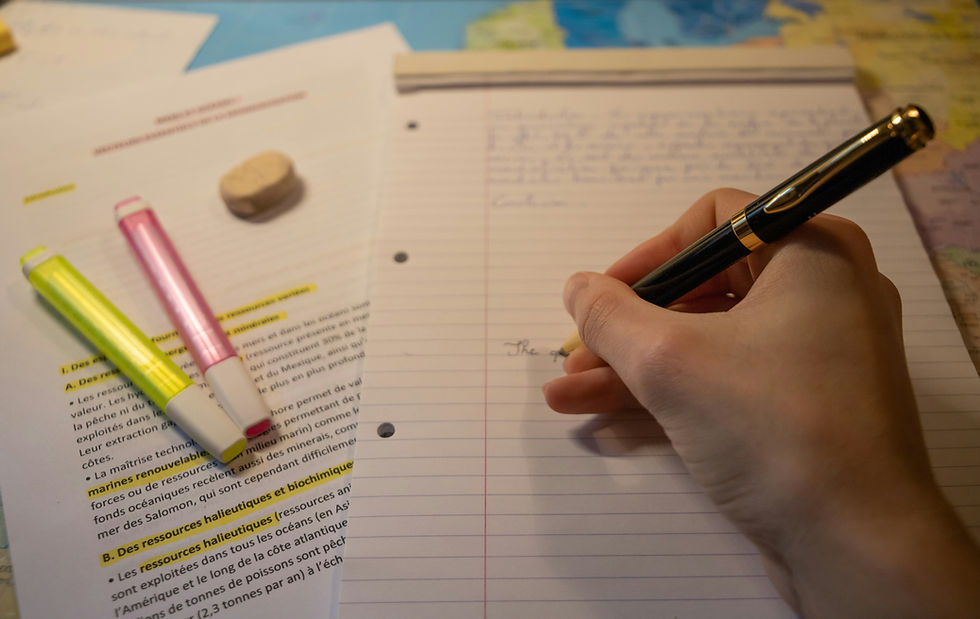Summer Camp Personal Statements: Beyond the Cliché
- Jul 24, 2025
- 4 min read
Many students fear writing about summer camp experiences in their college admissions personal statement because they fear it will sound too cliché. But sometimes those experiences are so powerful that they do indeed make for a great essay. By focusing on unique aspects and personal growth, you can craft a unique, compelling personal statement that truly reflects your individuality. In this post, we'll explore effective writing tips for students to help you narrate your camp adventures in a compelling and authentic way. So, grab a pen and let's turn your experiences into a personal statement that shines.
Many of our students have written personal statements about summer camp or summer activities that have gained them admission to Ivy League schools including Brown, Dartmouth, U Penn, and Cornell. If they can do it, so can you!
Crafting a Compelling Summer Camp Personal Statement
Crafting a compelling personal statement about your summer camp experiences requires thoughtful reflection and creative writing. This section will guide you through the process of moving beyond clichés and capturing unique moments that truly represent your growth and character.
Moving Beyond the Cliché
Summer camp essays often fall into predictable patterns. To stand out, focus on specific, meaningful experiences that shaped you.
Start by brainstorming moments that left a lasting impact. Think about challenges you overcame, skills you developed, or relationships that changed your perspective.
Avoid generic statements about "making friends" or "learning independence." Instead, dive into the details of a particular event or interaction that illustrates these concepts.
Remember, admissions officers read thousands of essays. Your goal is to present your camp experience in a way that's fresh, authentic, and uniquely yours.
The more specific your experience, the less likely it will feel cliché.
Capturing Unique Summer Camp Moments

To capture unique summer camp moments, focus on specific instances that highlight your personal growth or character.
For example, one of our students wrote an essay about how teaching drama therapy techniques to young children with cancer affected her. This experience inspired her to pursue a unique combination of theater and medicine, and she was accepted Early Decision to U Penn.
Another of our students wrote about how, while hiking at camp, he got a stomach bug and had to learn how to ask for help. He discovered that his friends didn't think it was burden to help him: it was a joy so that he could continue on the trip. He took that lesson into the rest of his life and into his education at Dartmouth.
Highlighting Authentic Experiences
In this section, we'll explore how to showcase your authentic experiences through effective storytelling and learning from challenges you faced at camp.
Storytelling to Showcase Growth
Effective storytelling is key to showcasing your personal growth in a summer camp personal statement.
Start with a strong opening that hooks the reader. Perhaps describe a moment of doubt or excitement that sets the stage for your story.
Structure your narrative with a clear beginning, middle, and end. We recommend about 200 words introducing a struggle, 200 words about what you learned, and 200 words about how you brought that lesson into the rest of your life. That gives you 50 "wiggle-words" to use as well.
Show, don't tell. Don't describe a setting: talk about how you felt within that setting. The more personal you get, the more your reader can connect with you.
Conclude by reflecting on how the experience changed you. What lessons did you learn? How have you applied these insights in your life since camp?
Learning from Challenges at Camp
Summer camp often presents unique challenges. When writing about those challenges, try to include the following.
Transformation. The reader should see a clear before and after.
Gratitude. No woe-is-me stories. We want to see why you're grateful for these challenging experiences.
Grit. Genuine perseverance costs something. Show us what this lesson cost you and what you gained from it.
Remember, admissions officers are interested in your ability to learn and adapt. Show how camp challenges prepared you for future obstacles.
Essential Writing Tips for Students
This final section offers crucial advice for crafting a standout personal statement, focusing on avoiding common pitfalls and infusing your unique personality into your writing.
Avoiding Overused Tropes
When writing about summer camp, it's crucial to steer clear of overused tropes that can make your essay blend in with others.
Avoid generic statements like "I made lifelong friends" or "I learned to be independent." While these may be true, you can be more specific than that.
Instead of broad generalizations, focus on specific moments or interactions that illustrate these concepts. Do you see the pattern we're harping on? Specificity is key.
Be wary of generalized language like "life-changing experience" or "unforgettable summer." These phrases have lost their impact through overuse. Find fresh ways to express the significance of your experience.
Infusing Personality and Passion
Your personal statement should reflect your unique voice and passions. This is your chance to show admissions officers who you really are.
Write in a tone that feels natural to you. If you're naturally humorous, let that shine through. If you're more reflective, embrace that style. Authenticity is key.
On humor, though: we love humor. Humor demonstrates mastery of language and some levity in the way you reflect. Include it if you can!
Don't be afraid to show vulnerability. Discussing challenges you faced or mistakes you made (and learned from) can make your essay more relatable and genuine.
Remember, the goal is to give admissions officers a glimpse into your personality and potential as a student and community member.
If you're stuck or need help applying these ideas, email us at info@kingfisherprep.com and we can set up a free consultation call!





Comments